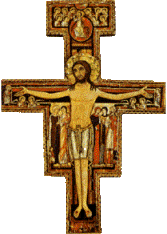May the Lord give you peace.
It seems that the death of bin Laden has had a mixed effect on me, causing me to search for a real gospel approach to the problem of enmity and hatred. Through twists and turns I discovered the book The Saint and the Sultan by Professor Paul Moses. As soon as I entered its realm, I found myself open to its inspiration and nourished by its meaning. What I discovered was the 'sonorous voice of St. Francis' singing a neglected gospel canticle of peace and reconciliation to a world trapped in an unholy embrace of hostility and death.
The author is a journalist, not a historian, nevertheless he utilizes extensive travel and research into the life and times of St. Francis. The Seraphic Saint is revealed beyond the traditional sources through additional chronicles, journals, and documents. There are substantial notes and references, yet its very readable. The portrayal of St. Francis is very convincing, because we see him committed to the gospel in a way that signals his uncompromising belief in the transformative power of love and pardon. (see Article XIX, SFO Rule)
One of the goals of the book is to reignite Francis of Assisi's missionary vision of peace among peoples who are estranged. To understand what Francis has to say we must first see his conversion in the context of his lived experiences, particularly his intimate contact with war; its bloodshed, imprisonment, and all the other demons that swirl around the battlefield. This perspective is what makes the book a success. It's into this wounded and tortured soul that the seeds of the gospel find their mortified soil. Now the young Francis is sufficiently transformed to encounter the Savior in his vision. From here he laucnches into a new life of penance and poverty with no restraint.
The Saint and the Sultan attempts to explain why the message of St. Francis (specifically regarding his attitude toward war) is clouded. According to the author, those attempting to convey the charism of Francis are caught in conflicting cross currents. Then as now, the first casualty of war is truth. The aura of St. Francis had to pass through a Church mired in difficult circumstances. Even the rivalry within the early Franciscan Order plays some part in altering the sublime message.
Perhaps this 'cover up' is the most controversial claim of the book. Nevertheless, I chose to align with the stated goal of revealing St. Francis as the model of peacemaker in the highest order. The radical expression of the gospel as shown in the life of Francis remains the more relevant message and overshadows the need to find a conspiracy.
The Church of his time is in disarray, but we already knew this, since Christ himself spoke to the Poverello…'Francis, go and repair my Church, which you can see is falling into ruin'. The real and imagined heresies bred suspicion and anxiety and raised the specter of severe condemnation, even death to those taking opposing positions. Professor Moses reveals to his readers the historical scene and its relevant characters candidly, yet he meticulously sticks to his theme while sparing his readers a diatribe. This is one of the subtle lessons of the book.
During the lifetime of Francis, the relic of the 'True Cross' accompanied the Crusaders into battle. Thus the Cross became both divine protection and weapon against the foe. One's standing with God was manifested in the winning or losing of the battle; but either way, the mission was deemed sacrosanct. While the worldly Francis would have applauded this, the penitent Francis came to see through it with a more penetrating vision.
For Francis in his journey, the 'True Cross' remains a symbol of victory; but one of victory over sin and death. The power of the Cross is inherent in one's surrender to the Will of the Father, which Christ did in accepting the burden of the sins of the world. For Francis, this giving of oneself to God (for Christians through Christ) is in some manner recognizable in the belief of the Saracens. The term 'Islam' means 'submission to the will of God and obedience of His law'. Francis indeed wanted to convert the Saracens (not merely coexist with them), but he already recognized and affirmed the innate image of God in the hearts of the foe. For Francis, to enter into mortal battle with others contained no glory, but rather came to signify a tragedy; a nullification of the gospel itself. 'Love your enemies, pray for those who persecute you.'
For me there are two important findings in this work. One is a real satisfaction in having contemplated a more lucid understanding of St. Francis; he's always been more enigmatic than I'm comfortable with. For this alone, The Saint and the Sultan deserves to be recognized as a contribution to the understanding of the Poverello. I'm grateful for having seen a new perspective which actually strengthens my commitment to his way of life.
The second finding is the promotion of a message that's been obscure and badly needed. To my mind, the practice of gospel peacemaking as St. Francis shows is not tied to consensus thinking nor does it require the approval of others. It is willing to go it alone with its only requirement being a purified heart and faithful recognition of the divine seed in the other. The other is never evaluated in terms of their moral state or worthiness; love and pardon are extended unconditionally. Even the prospect of a failed attempt at peace is unimportant; indeed it is a distraction, because the work of bringing gospel love and forgiveness is life-giving to the bearer and efficacious to the world, even when it is scorned.
Comments welcomed. Peace and all good.






1 comment:
I appreciate how this book sheds light on St Francis’s commitment to peace.
Post a Comment